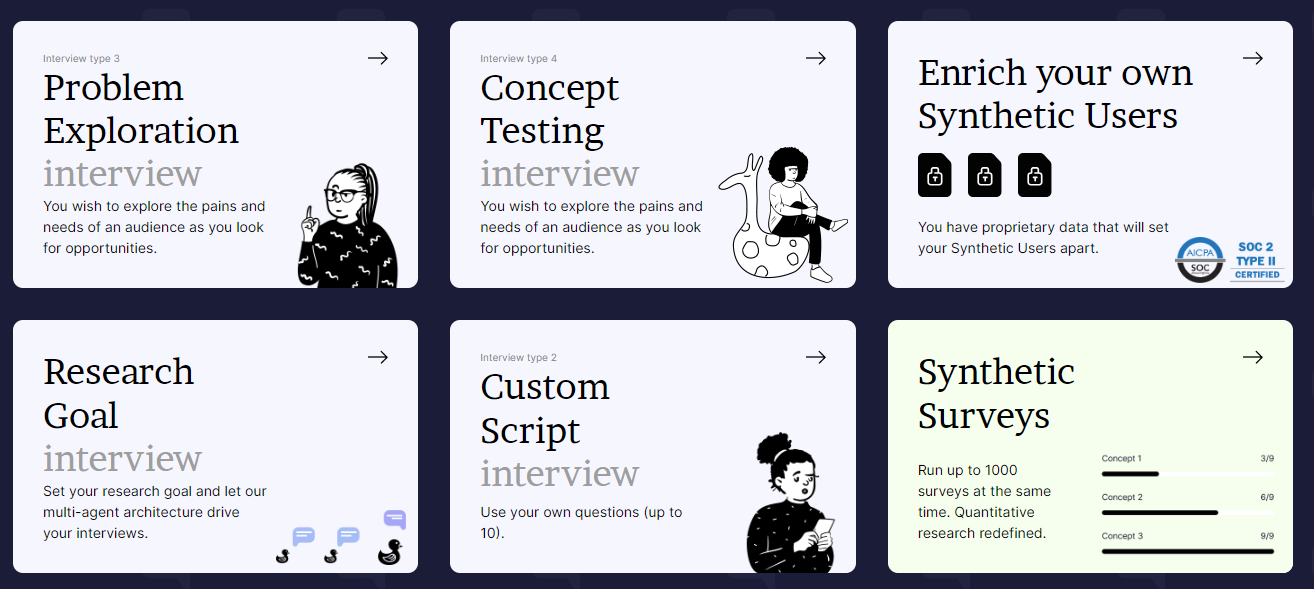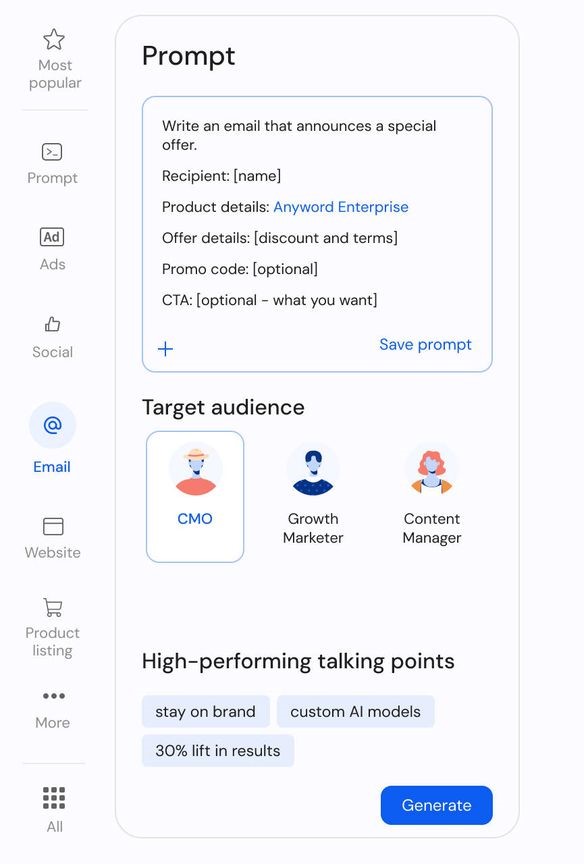AI is an incredibly powerful tool for healthcare marketing and has already started to transform the industry. When many people think of AI, they think of generative AI like ChatGPT. However, the real value of AI in healthcare marketing is its power to crunch data and provide a data-supported foundation of insights on which the rest of your marketing can be built. AI can handle multiple large datasets and provide analysis that would be difficult and time-consuming for humans.
Table of Contents
How Healthcare Marketers Are Using AI
The first thing to know about AI is that it’s not actually intelligent. It’s not a doctor, a marketing expert, or an insightful strategist. It’s more like an eager-to-please student who is going to hastily research to tell you whatever it thinks you want to hear based on your instructions — with no guarantees that any of it is factual. If you’ve been following the news lately, you know that Google’s newly added AI Search has been mocked for telling users to eat rocks, glue, and undercooked chicken.
This is why all AI tools need to be deployed strategically by experts who understand how to use them properly. An AI given bad instructions or pulling data from untrustworthy sources is not going to produce good results. But when used properly, especially for data analysis, AI tools can offer a way for marketers to improve efficiency, predict performance, and supercharge their data analysis.
“AI is not a pocket-sized Don Draper. The supercomputer is not gonna be this brilliant creative mind that is gonna come in and revolutionize your positioning. It is gonna allow you to do some things that were previously laborious that will help you to create a testing engine to understand what messaging works, and to create a copy generation engine that is much faster than manually coming up with all these copy concepts yourself.”
—Rich Briddock, Chief Strategy Officer, Cardinal Digital Marketing

Using AI For Copywriting and Content Ideation
Generative AI is the primary use case for AI that most marketers are familiar with. There are multiple options available for users looking to have AI do their copywriting, such as:
- Copy.ai
- Chat GPT
- Writesonic
- Jasper.ai
- Describely.ai
Although AI-generated copy still requires a lot of iterating and editing the output to produce something worth using, some users still find value in generating copy through AI.
“I have a custom GPT I trained for external new patient communications that I’ve gotten to have a fairly consistent tone and one for internal communications that uses a slightly different tone. Typically, with a good prompt and several iterations, followed by manual editing, I can get to a final document in less time than it would take manually.”
—Paul Gruensfelder, VP of Marketing at Select Dental Management
Even for healthcare marketers who would rather not use AI to generate their copy, there is value to be had in harnessing AI’s powerful data analysis for content ideation. Marketers can use AI to crunch the data and determine which issues are most frequently being talked about by patients. AI can even suggest topics for posts and emails that are more relevant to patients.
AI Tools For User Research
The best way to reach patients is to know what they want. AI can automatically organize survey results to help visualize important trends. It can also provide an in-depth analysis of all available data on how patients feel about various services, as well as identifying patient patterns in website usage. These insights not only allow a redesign keyed to optimizing the patient experience, but also allow for easier segmentation to improve and personalize marketing efforts.
Once patient profiles have been identified, some AI tools can even create virtual patients that mimic real patient behaviors to provide additional data points on site usage. While the “average user” may never exist, multiple differentiated profiles can be created. Whether you’re creating virtual users or just analyzing your current user data, you can consider using AI marketing tools like:
- Maze
- Synthetic Users
- QoQo
- Notably.ai
- Dovetail

These tools can offer additional insight into user behavior, optimize your current surveys, and potentially allow for new market research and feedback before a site update is launched without needing human users.
“Synthetic Users actually creates AI users based on target ICP (ideal customer profile) information you put in. You tell the platform about your target persona and it will AI generate those personas, those users, and then you can ask them questions like a focus group. We’ve done this for a couple clients and we’ve felt like the results we’ve got from this have been pretty on point with the knowns that we have from actual focus groups that we’ve done ourselves. The outputs have been very similar.”
—Rich Briddock, Chief Strategy Officer, Cardinal Digital Marketing
AI Video Analysis & Podcast Transcription
AI is great at automating well-defined tasks that would be time-consuming to do by hand, and creating transcripts of podcasts and videos falls squarely into that category. AI video tools can not only generate complete transcripts of videos but also analyze and summarize key themes for each section, giving you a head start on putting together clips and writeups for social media.
There are plenty of good options for automated transcripts and more:
- Speak AI
- Fathom
- Trint
- Otter.ai
- Notta.ai
If you’ve ever had to repeatedly re-watch an interview you’ve done to try to find appropriate clips to share online, you know how valuable an automated searchable transcript with topic highlights can be.
“AI has really multiplied our efficiency on so many things. It’s really fun. I’ve enjoyed it. Even just prompting is interesting and fun to me. Since then, I’ve been working on an AI chatbot, which I want to integrate into our website. That’s the project I’m working on this year that I’m really excited about.”
—Maite Uribe-Echevarria, VP of Marketing at Sanova Dermatology
AI Forecasting & Predictive Analysis
Predictive analysis drives a lot of modern healthcare marketing because most companies like to have an idea of what campaigns will perform well before launching them. AI forecasting is a powerful tool that gives marketers the ability to predict future trends based on historical data—which means data-driven campaign strategies with more efficient resource allocation.
By analyzing data to see what patients are searching for, predictive AI tools can identify patient patterns and calculate how likely they are to seek out certain healthcare services. This lets healthcare marketers stay ahead of their competition by understanding what types of campaigns will perform well with certain patient groups and allows the option of proactively reaching out to target groups with a campaign specifically tailored to resonate with them while offering the services they need.
AI forecasting tools include:
- Vertex
- SEOmonitor
- SAP Predictive Analytics
- SAS Analytics
- H2o.ai
Data Analysis With AI
I’ve been championing data integration for years because your data is only as good as the actionable insights you can get out of it. AI is perfect for crunching a bunch of data and spitting out useful insights and visualizations to help you improve your marketing strategies as well as your patient care. Here are some of the top AI data analysis options:
- Peerlogic
- Tableau
- Polymer
- Akkio
- Monkeylearn
You’re probably sitting on a lot of data that could be valuable to your healthcare organization, but there are obstacles preventing you from accessing it. Maybe it’s siloed, maybe it’s trapped in legacy systems, or maybe you just don’t have the time/money/resources to get at it. However, by using AI to analyze patient data, reviews, and surveys, you can spot the larger trends in the data. Gaining insights into the patient experience and satisfaction levels will let you identify key needs in the patient population—and adjust your marketing and healthcare services accordingly.
What’s more, you can even use this data proactively to generate new marketing. That’s what e-commerce has been doing for years, and now healthcare marketers are seeing what AI can do for other industries and figuring out how to adopt similar strategies.
“The concept is that CarMax sells cars. People write reviews on cars. What they did was build a large language model based on the reviews that people wrote about cars. Now, when you go look up Audi R8 or something, it will generate what people like about the cars from blogs and reviews based on actual internal AI data. It’s a brilliant use case because they’re pushing SEO to a new level.”
—Ibrahim Albaba, Analytics Manager at CLS Health
Enhancing SEO with AI
Using AI in SEO isn’t exactly new, as anyone who has used Google’s Keyword Planner knows. However, analyzing search trends can give you insights that can help you find the best keywords and optimize content. And good tools can also help you track competitors and boost your website rankings on Google.
“We use some AI tools for forecasting, like SEO Monitor, and we use Writesonic for AI content support. We then, of course, use the standing AI support tools like ChatGPT for general market analysis, framework, and competitive intelligence. Lastly – many of the standard SEO tools like Semrush, Screaming Frog, etc, are also implementing AI for support, which is a little less ‘interesting’ but still part of the machine.”
—Rob Sauter, SVP of Earned & Owned Media, Cardinal Digital Marketing
Elevating Performance: Advanced AI Applications in Healthcare Marketing
Beyond the basics of how healthcare marketers are already using AI, there are a few opportunities for using more advanced AI applications in healthcare marketing looking forward:
Patient-Centric Messaging & Copy
Anyword is an AI copy creation platform that generates copy using a 3-pronged approach, incorporating:
- A detailed patient persona
- Competitor ad copy
- Customer sentiment analysis
It combines these three inputs to create detailed prompts and generate copy aimed squarely at a particular group of potential patients.
“Anyword is also iterating off stuff that already works with similar brands. So, for example, if you are Talkspace and you use this and maybe BetterHelp is using it too… it knows what is working for BetterHelp and it can tell you that something is likely to perform, because we’ve seen this perform well with similar brands. When you look at a specific asset, it will tell you how well it resonates with each of your personas, whether it’s a gender neutral tone of voice, whether it’s more a female neutral tone of voice, male neutral, and what age groups it thinks it will appeal to in terms of language that’s being used. So maybe, if you’re talking to 65+, you’re using more arcane language. The better you set it up and the more time you spend with it, the better the output is gonna be.”
—Rich Briddock, Chief Strategy Officer, Cardinal Digital Marketing

Ad Performance Forecasting
Google continues to dominate the ad market, and its Vertex AI (built on its Gemini AI) provides forecasting models for deep machine learning. Its TiDE model architecture greatly sped up performance, allowing speedier data forecasting—and few people have more data on ads than Google itself.
This allows forecasting that not only analyzes various scenarios and predicts future performance but provides actionable insights that can drive budget recommendations and other campaign optimizations.
“AI definitely helps to unlock some of those forecasting capabilities. We went from using performance planner and doing manual logarithmic regressions for our clients, to leveraging Google Vertex AI, which has a pretty cool forecasting solution and model, which uses machine learning.”
—Rich Briddock, Chief Strategy Officer, Cardinal Digital Marketing
AI-er Beware: Caveats and Considerations
While it’s easy to be excited about the many possibilities for healthcare marketing and AI, there are three things you should keep in mind before rushing off and immediately signing up for all the powerful AI tools mentioned above:
1) AI Can Lie
From Google’s AI suggesting that people should eat rocks and glue to lawyers finding that AI research cites non-existent cases, anyone using AI needs to understand that you can’t blindly trust what it tells you. Any content or recommendations generated by AI must be QAed by a human expert with enough knowledge to know the trash from the treasure—because AI will offer you both with the same amount of confidence.
2) HIPAA Compliance is Required
AI doesn’t know enough to follow HIPAA regulations, which means you have to be responsible with all PHI. This means not feeding PHI into any AI without a Business Associate Agreement in place — which includes training AI on patient data.
It’s easy to forget this when tempted by the efficiencies of ChatGPT, whether you’re setting up a chatbot that could quickly answer patient queries about their specific information or using AI to generate a transcript of a patient-physician conversation and produce medical notes. But feeding that data to ChatGPT means feeding it to another company – OpenAI – with which you probably don’t have a BAA. And that’s a HIPAA violation.
However, if you contract with a data analytics firm with a BAA in place, then you can make use of their proprietary AI without risk of HIPAA violation.
3) AI is Not Always More Efficient
AI is a technology with a lot of potential, but blindly adopting without evaluating how it fits into your system is a recipe for disaster. ChatGPT keyword suggestions can be useful, but aren’t a replacement for Semrush. Generative AI may offer ideas, but will need a lot of QA to filter out the bad ideas.
In short, using AI just to use AI will often end up creating more work than it saves, so it’s important to ensure that the technology is deployed with specific goals in mind.
The key, as always, is to figure out how to leverage AI to do what AI does best—and make sure that smart and experienced humans oversee the process.
For a more depth look at how you can integrate these tools into your marketing strategy, watch our livestream recording and view our presentation deck on the topic.

